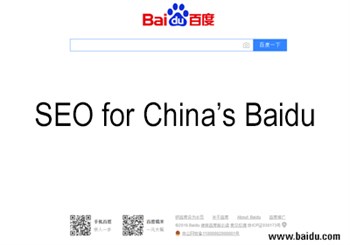SEO for China’s Baidu
Baidu is China’s largest search engine and has nearly 75% market share of the Chinese search engine market. Which means, the visibility of your website in the Chinese market depends on how well you optimize your content for Baidu. But where do you start?
China has very strict internet laws and the language is complex, so it may seem daunting to localize and optimize your website to enter the Chinese market. However, with a population of over 1.3 billion people ( 18% of the world’s population), 640 million of whom access the internet, China represents an attractive market for many companies.
How SEO for Google and Baidu Differ
Google has dominate control in global search, but not in every market. China is one of the places where Google doesn’t have a large presence. Google only controls around 10% of the search engine market in China. So relying on Google-centric SEO tactics will not necessarily help you attract a China-based audience.

Below are a few key differences between Baidu and Google SEO:
- The time it takes to be indexed. Baidu takes much longer than Google to examine website content, due largely to the strict control of website content in China. So your website will take longer to be visible in Baidu searches, than it would in Google searches.
- Meta descriptions and keywords. Baidu places a higher emphasis on meta descriptions and keywords than Google does.
- Internal links. Unlike Google, Baidu has a clear hierarchy on websites, the higher level page is preferred. This is illustrated by the amount of content on many Chinese website homepages.
- Paid content. Baidu prioritizes paid results more than Google does.

Baidu SEO Tips
Recently, Morten Fillipsen, Partner and Head of Asia for Mediagroup Worldwide, wrote a blog for
Finance Magnets detailing some effective organic SEO tips for mastering Baidu. A few of his tips included:
-
- Content language. All content needs to be in Simplified Chinese, including title tags and metadata.
- Off-site SEO. Baidu still lags behind Google when evaluating inbound links. There has been a higher value placed on quantity over quality, which makes link building schemes difficult. However, this area continues to improve.
- Site structure. Baidu’s crawler is not as powerful as Google’s, so keep your site simple, flat structured and limit the amount of clicks needed to get to content.
- Local domain. Baidu prioritizes sites in the following order:
- Locally hosted .cn/.com.cn
- Non-local .cn/.com.cn
- All other domains.
- Censorship. Censorship is a very serious concern in China. Any page containing blacklisted words will cause Baidu to penalize the page or de-index the entire site.
Summary
In this blog, we covered just some of the tactics to include in your Baidu SEO strategy. Baidu is an entirely different search engine than Google and should be treated as such. If you want to have your website content found by your China-based audiences, you have to employ a strategy that will work for that market. Translation, localization, SEO and SEM for Baidu should all be a part of your plan.
China represents a unique market for foreign and domestic companies. The people, habits, language, culture and government all play a major role in how you create content that will attract audiences. Each of these factors are tricky to navigate, but creating a thorough, well-researched plan for entering China will help your brand be successful in this very important global market.
Sources:
